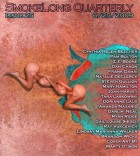I really like the role Norma Ermbauer plays here. What can you tell us about her?—and how she ended up in “Northern Migration” and what you see her role as?
Thanks. While Norma introduces the idea of geographic exchange from the start, she’s really there to keep Clyde honest and to keep what could be a grossly internalized story grounded in the real world. If I hadn’t sold my accent years ago, I’d want her to have it, too.
What’s the oddest thing you’ve ever sold?—ever bought?
Years ago, I helped a good buddy of mine with a yard sale before he moved to Texas. At one point in the afternoon (long before the desperate last push), we sold three questionable cinnamon sticks in a torn sandwich bag for a nickel. It’s amazing what people will buy if they think they’re getting a bargain.
I had no idea there was such a thing as “Northern” migration. When and how did you discover it?
Literally, I probably discovered it (the title) on my third revision. Conceptually, it was already there. Here we have a character who feels so encumbered by the commodification of his own southern identity that he just needs to get rid of it and move on—which entails severing a lot of what he loves. I’m struck by a similar notion whenever I revisit my own hometown, a place which aggressively markets itself as quaint and Southern, and has subsequently become something of a disingenuous retirement destination. So maybe Clyde’s own “migration” can be seen as a reversal of this idea.
Of course, there’s also the historical northern migration—the mass exodus of African Americans post-Reconstruction—but those racial underpinnings don’t really have a home in this story.
How does your poetry complement your writing of (very) short fiction? What drew you to the flash form?
I don’t find too many occasions to write poetry or flash fiction, but when I do, it’s because there is a singular gesture that demands a particular kind of scrutiny—one that is both lyrical and narrative. As for this piece, I felt the gesture (the yard sale) had to be more narrative, and that its lyricism was already tied up in the fantastic nature of the sale. The original draft was about 2000 words which, frankly, was far too long to sustain itself.
What’s it like teaching Freshman Lit at Emory? What are some of the highlights of the past semester(s)?
I don’t know how to answer this question without sounding treacly. It really is a source of joy. I get to teach material that I love, and the kids are almost preternaturally engaged. One of my fondest moments was when a student approached me after class to gush about a Sherwood Anderson story we read. I had a similar experience as an undergrad over the exact same story, so I found a guilty little torch-passing pleasure there.



 The SmokeLong Grand Micro Contest (The Mikey) is now an annual competition celebrating and compensating the best micro fiction and nonfiction online.
The SmokeLong Grand Micro Contest (The Mikey) is now an annual competition celebrating and compensating the best micro fiction and nonfiction online.